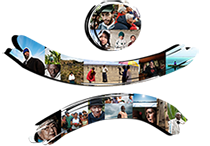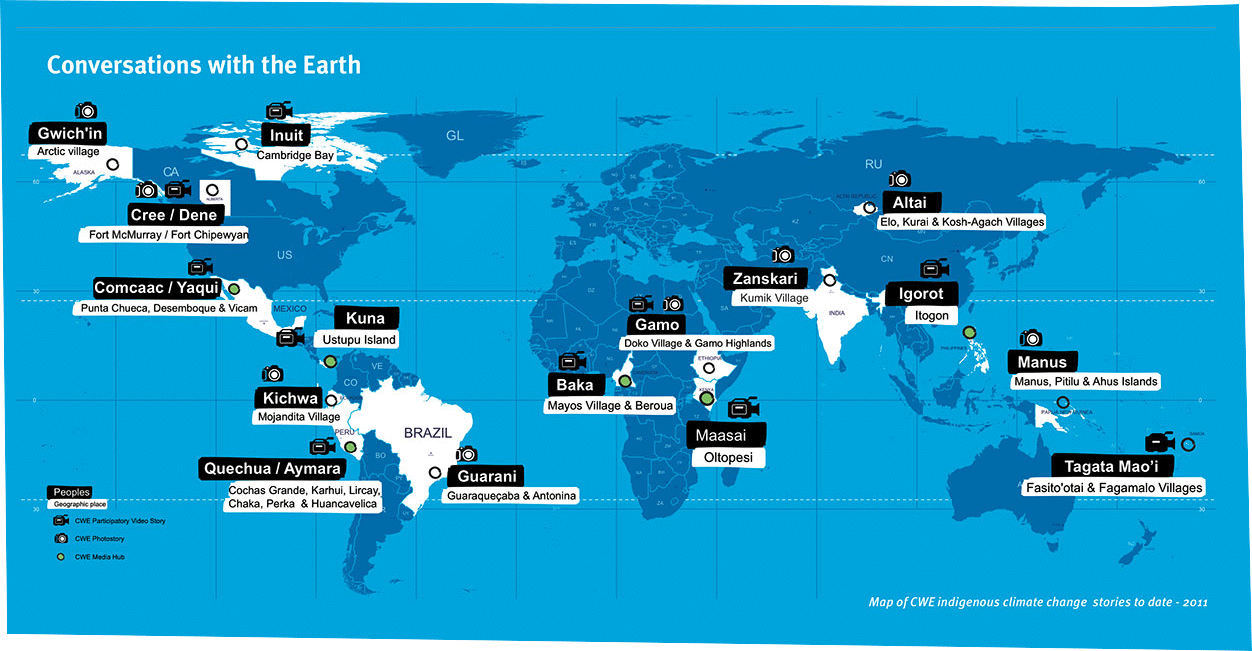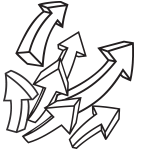Conversations with the Earth (CWE) is a way of listening closely to traditional custodians of the world’s biocultural diversity and sharing their unique stories via world class multi-media exhibitions, video screening festivals and educational mobile exhibits, in order to raise global awareness and inform global and local responses to multiple environmental challenges.
CWE was founded in 2009 by an international indigenous-led advocacy and education organization for the rights of indigenous peoples, Land Is Life, renowned experts in participatory video, InsightShare, and award-winning photographer and expert in sustaining oral traditions, Nicolas Villaume, founder of Conversations du Monde association.
Indigenous voices on Climate Change

Compared to the dominant industrialized societies, Indigenous Peoples have contributed least to climate change. Still, they suffer the brunt of the immediate and direct effects of escalating climate disruption. Despite the September 2007 adoption by the UN General Assembly of the UN Declaration on the Rights of Indigenous Peoples (UNDRIP), Indigenous Peoples continue to be excluded from the UN climate negotiations – the embodiment of climate injustice. At this critical time of global decision-making, Indigenous voices have important knowledge and wisdom to contribute to the global discourse on climate change that guides global choices in shaping our collective future. From Manus Islanders in Papua New Guinea working together to save their oceanside homes, to Maasai villagers in Kenya responding to a cattle-killing drought in the open grasslands, CWE works hard to enable local Indigenous communities to create and share first-hand accounts of their experience of climate change.
 Grounded in respectful long-term partnership between indigenous-led organizations and award-winning experts in participatory video, journalism, photography, and audio, CWE conveys local testimonies of the impacts of climate change on indigenous communities, stories of the unintended consequences of imposed mitigation efforts on local livelihoods, and examples of traditional knowledge and its value in developing appropriate responses to climate change.
Grounded in respectful long-term partnership between indigenous-led organizations and award-winning experts in participatory video, journalism, photography, and audio, CWE conveys local testimonies of the impacts of climate change on indigenous communities, stories of the unintended consequences of imposed mitigation efforts on local livelihoods, and examples of traditional knowledge and its value in developing appropriate responses to climate change.
Core Beliefs
 Traditional and indigenous communities have for millennia depended on a healthy relationship with their territories and therefore possess a wealth of knowledge, wisdom, and practical experience in adapting to long-term changes in their environment. And yet indigenous communities are extremely vulnerable to the current unprecedented rate of global climate change, with its large-scale external disruptions to the web of life. This threat to traditional communities is a threat to the entire human family.Proposed or implemented responses to the common challenges of climate change will fall short, unless they are grounded in a recognition of the territorial, land, and resource rights of indigenous peoples. The traditional ecological knowledge, wisdom and practices of indigenous peoples comprise the global biocultural heritage that must inform and guide climate change adaptation and mitigation strategies at global, regional and local scales.
Traditional and indigenous communities have for millennia depended on a healthy relationship with their territories and therefore possess a wealth of knowledge, wisdom, and practical experience in adapting to long-term changes in their environment. And yet indigenous communities are extremely vulnerable to the current unprecedented rate of global climate change, with its large-scale external disruptions to the web of life. This threat to traditional communities is a threat to the entire human family.Proposed or implemented responses to the common challenges of climate change will fall short, unless they are grounded in a recognition of the territorial, land, and resource rights of indigenous peoples. The traditional ecological knowledge, wisdom and practices of indigenous peoples comprise the global biocultural heritage that must inform and guide climate change adaptation and mitigation strategies at global, regional and local scales.
Way Forward
 Premiering as a major multimedia exhibitions at the National Museum of Denmark and the Klimaforum, in Copenhagen (December 2009), CWE highlighted indigenous stories of climate change as delegates gathered for the watershed UN Framework Convention on Climate Change (UNFCCC) 15th Conference of the Parties meeting (COP15). The CWE Copenhagen exhibit brought together audio documentaries, participatory videos, photo essays, published articles, and an interactive website into a powerful multi-sensory series of narrative portraits. The museum exhibit worked to support in-person presentations by over 20 representatives of 12 indigenous communities from the CWE network whose stories were told in the museum galleries and at the Klimaforum.
The CWE is an open invitation to the world to engage in a dialogue about the real impacts of climate change on marginalized communities, as well as an opportunity for local communities to grow together in a global network of sharing, reflection, action and support. Since COP15, CWE has continued to bring Indigenous voices on climate change to key meetings around the world through CWE’s mobile exhibits (translated to date in 7 languages), participatory video screenings at international film festivals, and in-person presentations of delegates from CWE partner communities. Venues have included the World People’s Conference on Climate Change and the Rights of Mother Earth in Cochabamba, Bolivia; the 10th International Festival of Film and Video of Indigenous Peoples in Quito, Ecuador; the US Social Forum in Detroit, Michigan; the UNFCCC COP 16 meeting on climate change in Cancun, Mexico; and National Geographic’s All Roads Film Festival in Washington, DC. Most recently in the United States, CWE’s major exhibit was on display at the Smithsonian’s National Museum of American Indian in Washington, DC., for six months where it attracted over one million visitors. Currently, the CWE exhibit is touring various countries in Latin America, starting with Peru and Ecuador.
In addition to exhibitions, CWE has continued to grow its network and action by organizing participatory media trainings; creating new photostories with affected communities; and, enhancing indigenous communities’ capacity to connect with each other and the rest of the world through global gatherings, conferences and retreats.
CWE fosters long-term relationships with and between communities, based on principles of Free, Prior and Informed Consent (FPIC), local control and support for indigenous media capacity.
Premiering as a major multimedia exhibitions at the National Museum of Denmark and the Klimaforum, in Copenhagen (December 2009), CWE highlighted indigenous stories of climate change as delegates gathered for the watershed UN Framework Convention on Climate Change (UNFCCC) 15th Conference of the Parties meeting (COP15). The CWE Copenhagen exhibit brought together audio documentaries, participatory videos, photo essays, published articles, and an interactive website into a powerful multi-sensory series of narrative portraits. The museum exhibit worked to support in-person presentations by over 20 representatives of 12 indigenous communities from the CWE network whose stories were told in the museum galleries and at the Klimaforum.
The CWE is an open invitation to the world to engage in a dialogue about the real impacts of climate change on marginalized communities, as well as an opportunity for local communities to grow together in a global network of sharing, reflection, action and support. Since COP15, CWE has continued to bring Indigenous voices on climate change to key meetings around the world through CWE’s mobile exhibits (translated to date in 7 languages), participatory video screenings at international film festivals, and in-person presentations of delegates from CWE partner communities. Venues have included the World People’s Conference on Climate Change and the Rights of Mother Earth in Cochabamba, Bolivia; the 10th International Festival of Film and Video of Indigenous Peoples in Quito, Ecuador; the US Social Forum in Detroit, Michigan; the UNFCCC COP 16 meeting on climate change in Cancun, Mexico; and National Geographic’s All Roads Film Festival in Washington, DC. Most recently in the United States, CWE’s major exhibit was on display at the Smithsonian’s National Museum of American Indian in Washington, DC., for six months where it attracted over one million visitors. Currently, the CWE exhibit is touring various countries in Latin America, starting with Peru and Ecuador.
In addition to exhibitions, CWE has continued to grow its network and action by organizing participatory media trainings; creating new photostories with affected communities; and, enhancing indigenous communities’ capacity to connect with each other and the rest of the world through global gatherings, conferences and retreats.
CWE fosters long-term relationships with and between communities, based on principles of Free, Prior and Informed Consent (FPIC), local control and support for indigenous media capacity.
CWE Founding partners
Land is Life
 Land is Life was founded at the World Conference of Indigenous Peoples on Territories, Environment and Development in May of 1992. The mission of Land is Life is to support indigenous communities in their efforts to secure rights at the local and national levels, and move forward a process of dialogue and strategic action that would bring about the international legal recognition of indigenous peoples rights to self-determination and collective ownership of lands, resources and knowledge.
Visit site
Land is Life was founded at the World Conference of Indigenous Peoples on Territories, Environment and Development in May of 1992. The mission of Land is Life is to support indigenous communities in their efforts to secure rights at the local and national levels, and move forward a process of dialogue and strategic action that would bring about the international legal recognition of indigenous peoples rights to self-determination and collective ownership of lands, resources and knowledge.
Visit site
Conversations du Monde
 Founded in Paris in 2004 by French photographer Nicolas Villaume, the association Conversations du Monde primary focuses on promoting oral tradition and cultural awareness using the emotional power of combined arts (photography, videos, digital voice recordings and internet…) to create quality multimedia exhibitions for grassroots communities to leading international museums and education organizations.
Visit site
Founded in Paris in 2004 by French photographer Nicolas Villaume, the association Conversations du Monde primary focuses on promoting oral tradition and cultural awareness using the emotional power of combined arts (photography, videos, digital voice recordings and internet…) to create quality multimedia exhibitions for grassroots communities to leading international museums and education organizations.
Visit site
InsightShare
 InsightShare is a leading organisation in the use of participatory video as an experiential tool for individuals and groups to grow in self-confidence and trust, building skills to act for change. InsightShare’s methods value local knowledge and help people develop greater control over the decisions affecting their lives by building bridges between communities and decision-makers.
Visit site
InsightShare is a leading organisation in the use of participatory video as an experiential tool for individuals and groups to grow in self-confidence and trust, building skills to act for change. InsightShare’s methods value local knowledge and help people develop greater control over the decisions affecting their lives by building bridges between communities and decision-makers.
Visit site
 Compared to the dominant industrialized societies, Indigenous Peoples have contributed least to climate change. Still, they suffer the brunt of the immediate and direct effects of escalating climate disruption. Despite the September 2007 adoption by the UN General Assembly of the UN Declaration on the Rights of Indigenous Peoples (UNDRIP), Indigenous Peoples continue to be excluded from the UN climate negotiations – the embodiment of climate injustice. At this critical time of global decision-making, Indigenous voices have important knowledge and wisdom to contribute to the global discourse on climate change that guides global choices in shaping our collective future. From Manus Islanders in Papua New Guinea working together to save their oceanside homes, to Maasai villagers in Kenya responding to a cattle-killing drought in the open grasslands, CWE works hard to enable local Indigenous communities to create and share first-hand accounts of their experience of climate change.
Compared to the dominant industrialized societies, Indigenous Peoples have contributed least to climate change. Still, they suffer the brunt of the immediate and direct effects of escalating climate disruption. Despite the September 2007 adoption by the UN General Assembly of the UN Declaration on the Rights of Indigenous Peoples (UNDRIP), Indigenous Peoples continue to be excluded from the UN climate negotiations – the embodiment of climate injustice. At this critical time of global decision-making, Indigenous voices have important knowledge and wisdom to contribute to the global discourse on climate change that guides global choices in shaping our collective future. From Manus Islanders in Papua New Guinea working together to save their oceanside homes, to Maasai villagers in Kenya responding to a cattle-killing drought in the open grasslands, CWE works hard to enable local Indigenous communities to create and share first-hand accounts of their experience of climate change.
 Grounded in respectful long-term partnership between indigenous-led organizations and award-winning experts in participatory video, journalism, photography, and audio, CWE conveys local testimonies of the impacts of climate change on indigenous communities, stories of the unintended consequences of imposed mitigation efforts on local livelihoods, and examples of traditional knowledge and its value in developing appropriate responses to climate change.
Grounded in respectful long-term partnership between indigenous-led organizations and award-winning experts in participatory video, journalism, photography, and audio, CWE conveys local testimonies of the impacts of climate change on indigenous communities, stories of the unintended consequences of imposed mitigation efforts on local livelihoods, and examples of traditional knowledge and its value in developing appropriate responses to climate change.
 Traditional and indigenous communities have for millennia depended on a healthy relationship with their territories and therefore possess a wealth of knowledge, wisdom, and practical experience in adapting to long-term changes in their environment. And yet indigenous communities are extremely vulnerable to the current unprecedented rate of global climate change, with its large-scale external disruptions to the web of life. This threat to traditional communities is a threat to the entire human family.Proposed or implemented responses to the common challenges of climate change will fall short, unless they are grounded in a recognition of the territorial, land, and resource rights of indigenous peoples. The traditional ecological knowledge, wisdom and practices of indigenous peoples comprise the global biocultural heritage that must inform and guide climate change adaptation and mitigation strategies at global, regional and local scales.
Traditional and indigenous communities have for millennia depended on a healthy relationship with their territories and therefore possess a wealth of knowledge, wisdom, and practical experience in adapting to long-term changes in their environment. And yet indigenous communities are extremely vulnerable to the current unprecedented rate of global climate change, with its large-scale external disruptions to the web of life. This threat to traditional communities is a threat to the entire human family.Proposed or implemented responses to the common challenges of climate change will fall short, unless they are grounded in a recognition of the territorial, land, and resource rights of indigenous peoples. The traditional ecological knowledge, wisdom and practices of indigenous peoples comprise the global biocultural heritage that must inform and guide climate change adaptation and mitigation strategies at global, regional and local scales.
 Premiering as a major multimedia exhibitions at the National Museum of Denmark and the Klimaforum, in Copenhagen (December 2009), CWE highlighted indigenous stories of climate change as delegates gathered for the watershed UN Framework Convention on Climate Change (UNFCCC) 15th Conference of the Parties meeting (COP15). The CWE Copenhagen exhibit brought together audio documentaries, participatory videos, photo essays, published articles, and an interactive website into a powerful multi-sensory series of narrative portraits. The museum exhibit worked to support in-person presentations by over 20 representatives of 12 indigenous communities from the CWE network whose stories were told in the museum galleries and at the Klimaforum.
The CWE is an open invitation to the world to engage in a dialogue about the real impacts of climate change on marginalized communities, as well as an opportunity for local communities to grow together in a global network of sharing, reflection, action and support. Since COP15, CWE has continued to bring Indigenous voices on climate change to key meetings around the world through CWE’s mobile exhibits (translated to date in 7 languages), participatory video screenings at international film festivals, and in-person presentations of delegates from CWE partner communities. Venues have included the World People’s Conference on Climate Change and the Rights of Mother Earth in Cochabamba, Bolivia; the 10th International Festival of Film and Video of Indigenous Peoples in Quito, Ecuador; the US Social Forum in Detroit, Michigan; the UNFCCC COP 16 meeting on climate change in Cancun, Mexico; and National Geographic’s All Roads Film Festival in Washington, DC. Most recently in the United States, CWE’s major exhibit was on display at the Smithsonian’s National Museum of American Indian in Washington, DC., for six months where it attracted over one million visitors. Currently, the CWE exhibit is touring various countries in Latin America, starting with Peru and Ecuador.
In addition to exhibitions, CWE has continued to grow its network and action by organizing participatory media trainings; creating new photostories with affected communities; and, enhancing indigenous communities’ capacity to connect with each other and the rest of the world through global gatherings, conferences and retreats.
CWE fosters long-term relationships with and between communities, based on principles of Free, Prior and Informed Consent (FPIC), local control and support for indigenous media capacity.
Premiering as a major multimedia exhibitions at the National Museum of Denmark and the Klimaforum, in Copenhagen (December 2009), CWE highlighted indigenous stories of climate change as delegates gathered for the watershed UN Framework Convention on Climate Change (UNFCCC) 15th Conference of the Parties meeting (COP15). The CWE Copenhagen exhibit brought together audio documentaries, participatory videos, photo essays, published articles, and an interactive website into a powerful multi-sensory series of narrative portraits. The museum exhibit worked to support in-person presentations by over 20 representatives of 12 indigenous communities from the CWE network whose stories were told in the museum galleries and at the Klimaforum.
The CWE is an open invitation to the world to engage in a dialogue about the real impacts of climate change on marginalized communities, as well as an opportunity for local communities to grow together in a global network of sharing, reflection, action and support. Since COP15, CWE has continued to bring Indigenous voices on climate change to key meetings around the world through CWE’s mobile exhibits (translated to date in 7 languages), participatory video screenings at international film festivals, and in-person presentations of delegates from CWE partner communities. Venues have included the World People’s Conference on Climate Change and the Rights of Mother Earth in Cochabamba, Bolivia; the 10th International Festival of Film and Video of Indigenous Peoples in Quito, Ecuador; the US Social Forum in Detroit, Michigan; the UNFCCC COP 16 meeting on climate change in Cancun, Mexico; and National Geographic’s All Roads Film Festival in Washington, DC. Most recently in the United States, CWE’s major exhibit was on display at the Smithsonian’s National Museum of American Indian in Washington, DC., for six months where it attracted over one million visitors. Currently, the CWE exhibit is touring various countries in Latin America, starting with Peru and Ecuador.
In addition to exhibitions, CWE has continued to grow its network and action by organizing participatory media trainings; creating new photostories with affected communities; and, enhancing indigenous communities’ capacity to connect with each other and the rest of the world through global gatherings, conferences and retreats.
CWE fosters long-term relationships with and between communities, based on principles of Free, Prior and Informed Consent (FPIC), local control and support for indigenous media capacity.
 Land is Life was founded at the World Conference of Indigenous Peoples on Territories, Environment and Development in May of 1992. The mission of Land is Life is to support indigenous communities in their efforts to secure rights at the local and national levels, and move forward a process of dialogue and strategic action that would bring about the international legal recognition of indigenous peoples rights to self-determination and collective ownership of lands, resources and knowledge.
Visit site
Land is Life was founded at the World Conference of Indigenous Peoples on Territories, Environment and Development in May of 1992. The mission of Land is Life is to support indigenous communities in their efforts to secure rights at the local and national levels, and move forward a process of dialogue and strategic action that would bring about the international legal recognition of indigenous peoples rights to self-determination and collective ownership of lands, resources and knowledge.
Visit site
 Founded in Paris in 2004 by French photographer Nicolas Villaume, the association Conversations du Monde primary focuses on promoting oral tradition and cultural awareness using the emotional power of combined arts (photography, videos, digital voice recordings and internet…) to create quality multimedia exhibitions for grassroots communities to leading international museums and education organizations.
Visit site
Founded in Paris in 2004 by French photographer Nicolas Villaume, the association Conversations du Monde primary focuses on promoting oral tradition and cultural awareness using the emotional power of combined arts (photography, videos, digital voice recordings and internet…) to create quality multimedia exhibitions for grassroots communities to leading international museums and education organizations.
Visit site
 InsightShare is a leading organisation in the use of participatory video as an experiential tool for individuals and groups to grow in self-confidence and trust, building skills to act for change. InsightShare’s methods value local knowledge and help people develop greater control over the decisions affecting their lives by building bridges between communities and decision-makers.
Visit site
InsightShare is a leading organisation in the use of participatory video as an experiential tool for individuals and groups to grow in self-confidence and trust, building skills to act for change. InsightShare’s methods value local knowledge and help people develop greater control over the decisions affecting their lives by building bridges between communities and decision-makers.
Visit site
